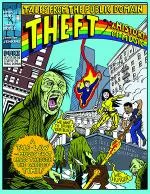
Tales from the Public Domain
James Boyle and Jennifer Jenkins discuss "Theft! A History of Music"
You can download the book here.
Event Description
This comic lays out 2000 years of musical history. A neglected part of musical history. Again and again there have been attempts to police music; to restrict borrowing and cultural cross-fertilization. But music builds on itself. To those who think that mash-ups and sampling started with YouTube or the DJ’s turntables, it might be shocking to find that musicians have been borrowing—extensively borrowing—from each other since music began. Then why try to stop that process? The reasons varied. Philosophy, religion, politics, race—again and again, race—and law. And because music affects us so deeply, those struggles were passionate ones. They still are.
The history in this book runs from Plato to Blurred Lines and beyond. You will read about the Holy Roman Empire’s attempts to standardize religious music with the first great musical technology (notation) and the inevitable backfire of that attempt. You will read about troubadours and church composers, swapping tunes (and remarkably profane lyrics), changing both religion and music in the process. You will see diatribes against jazz for corrupting musical culture, against rock and roll for breaching the color-line. You will learn about the lawsuits that, surprisingly, shaped rap. You will read the story of some of music’s iconoclasts—from Handel and Beethoven to Robert Johnson, Chuck Berry, Little Richard, Ray Charles, the British Invasion and Public Enemy.
To understand this history fully, one has to roam wider still—into musical technologies from notation to the sample deck, aesthetics, the incentive systems that got musicians paid, and law’s 250 year struggle to assimilate music, without destroying it in the process. Would jazz, soul or rock and roll be legal if they were reinvented today? We are not sure. Which as you will read, is profoundly worrying because today, more than ever, we need the arts.
Notes from the Talk
Artistic musical expressions like mash-ups and sampling are often thought of as unique and new phenomena emerging from participatory culture in the digital age. However, as James Boyle and Jennifer Jenkins, Professors of Law at Duke University, argue in their recent talk, “remix isn’t America’s future; remix is America’s past.” Boyle and Jenkins drew from their comic book, Theft: A History of Music, in which they tell the story of 2,000 years of musical borrowing.
Boyle and Jenkins chose to tell this story in a comic book format for two reasons. The first was to make scholarship accessible to a wider audience, outside of academia. The second was to use “remix in the service of talking about remix.” In other words, in the book, they use copyright limitations and exceptions within their own writing and art, in order to explain these same phenomena.
Two recent developments in copyright and its applications in the music industry concern Boyle and Jenkins. The more recent is the “Blurred Lines” case, in which a jury found that Robin Thicke and Pharrel Williams infringed on the copyright of “Got To Give it Up” by Marvin Gaye. The verdict was recently upheld by the 9th Circuit. The other development is a lawsuit involving unlicensed sampling of Funkadelic’s “Get Off Your Ass and Jam,” wherein the sample is largely unrecognizable, but the court still ordered that sampling more than one note requires a license. These developments are reflective of Lawrence Lessig’s idea of a “permission culture,” in which every time we “re-make” culture, we need to pay a fee, get a license, or at least ask permission.
Boyle and Jenkins ask the audience to consider the fact that if we had applied today’s legal rules during the times of jazz, blues, and rock 'n roll, we would likely not have these musical genres. Boyle summarizes this point, asking about the future: “what forms of music will we not have, and not know that we didn’t have, because we didn’t have them?” Overall, however, Boyle and Jenkins maintain some optimism for the outlook of music in American culture. They conclude with a quote from their book that expresses this confidence: “The staff of music is long, but it bends to harmony.”
notes by Donica O'Malley
About James
James Boyle is William Neal Reynolds Professor of Law at Duke Law School and the former Chairman of the Board of Creative Commons. He has written for The New York Times, The Financial Times, Newsweek and many other newspapers and magazines. His other books include The Public Domain: Enclosing the Commons of the Mind, Shamans, Software and Spleens: Law and the Construction of the Information Society, and Bound By Law a comic book about fair use, copyright and creativity (with Jennifer Jenkins).
About Jennifer
Jennifer Jenkins is a Clinical Professor of Law at Duke Law School and the Director of the Center for the Study of the Public Domain. Apart from her legal qualifications, she also plays the piano and holds an MA in English from Duke University, where she studied creative writing with the late Reynolds Price and Milton with Stanley Fish. Her most recent book is Intellectual Property: Cases and Materials (3rd ed, 2016) (with James Boyle). Her recent articles include In Ambiguous Battle: The Promise (and Pathos) of Public Domain Day, and Last Sale? Libraries’ Rights in the Digital Age.
You might also like
- communityLegal Alignment for Safe and Ethical AI
